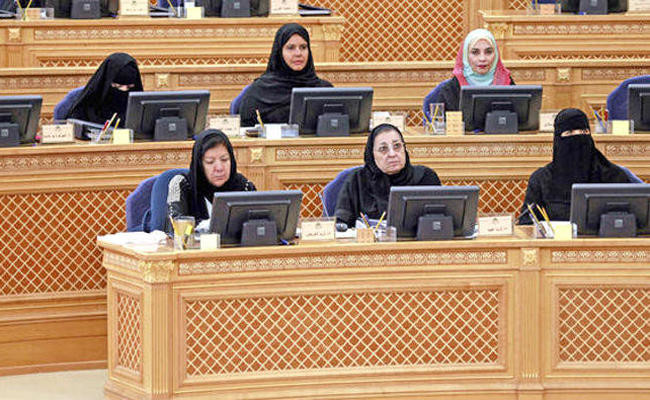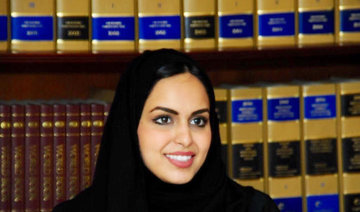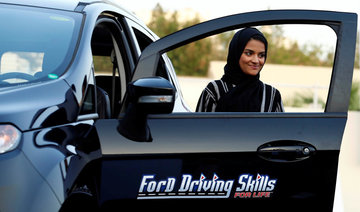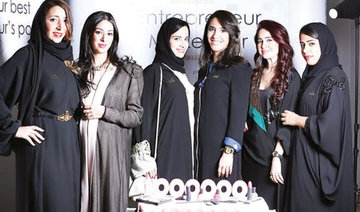JEDDAH: It was a year to remember for many Saudis. For the first time in history, 30 Saudi women took their seats as members of the Shoura Council in February 2013, and were sworn in before the presence of the late King Abdullah bin Abdul Aziz.
Five years on, female Shoura Council members are still playing a major role in different issues concerning social development in the Kingdom.
Saudi women in the Shoura Council have come a long way. Their achievements have been recorded in history and their powerful voices continue to be heard.
None of the women needs introduction, with each having a long history of achievements even before their appointment.
Lina Al-Maeena spent more than 15 years leading a fight for women’s sports in Saudi Arabia. She founded Jeddah United in 2003, Saudi Arabia’s first private female basketball club.
Despite facing a backlash, she pushed for acceptance in the conservative community and has finally won recognition with the realization that it is important for women to participate in sports activities.
In compliance with Vision 2030 — which includes development programs preparing the Kingdom for a promising future — the Saudi government has committed to elevating the status of sports in the Kingdom, a boost to promoting physical fitness for both men and women alike.
But promoting sports activities for Saudi women is not Al-Maeena’s only goal.
“It’s not simply about the empowerment of women in sports from an athletic point of view, I’m also looking at it from an economic perspective,” she said.
“Sports as a business is in line with the goal of Vision 2030 — to increase the number of women in the workforce from 22 percent to 30 percent. It’s not just the health, social benefits and development aspects, I’m very big on economics too.”
“When it comes to women's empowerment, I like to look at a gender as a whole, not just women,” adds Al-Maeena. “I advocate under the Shoura Council dome, for many environmental issues. Saudi Arabia is a member of the G-20 and we have a global responsibility to become supporters of a green lifestyle to sustain effective development.”
“It’s a golden age for Saudis and as women, we’ve come a long way. Every other day you see things happening and it’s a great celebration of achievements. We’re living this era of historical change, both pre- and post-Vision 2030 and we’re making up for lost time,” said Al-Maeena.
Fawzia Abalkhail, a professor of Information Technology and Education at Princess Noura hUniversity (PNU) who has a doctorate in the philosophy of education, is one of 20 new female Shoura members appointed in 2016.
She believes that every member of the Shoura Council has a national responsibility entrusted to them by the Custodian of the Two Holy Mosques by virtue of his appointment.
“As a female Shoura Council member, I support development issues in the education sector, health sector, public services and social affairs … [and in doing so] to support many fellow members in women empowerment issues,” said Abalkhail, appointed in 2013-2014 as the undersecretary of PNU for Graduate Studies and Scientific Research and vice president of PNU for health affairs.
“We focus on finding means of support and setting the standards that will increase women’s contributions in matters of social development, provide greater chances for assuming higher governmental positions as well as managerial roles in the private sector,” she said.
Abalkhail is of the opinion that Saudi women must gain skills in various fields in order to contribute. She believes a woman plays a pivotal role in society to ensure its stability and structural health, a role that is no less than a man’s.
“I am keen on laying the foundations and the right means in which all women can acquire the knowledge they need to enrich their social contributions,” said Abalkhail, who is also a member of the Saudi Society for Education and Psychological Sciences.
“Women are required to be their own self-development researchers. I am very interested in making sure education is improved, facilitate it and widen the scope beyond academic constraints. In doing so, a wider range of knowledge exchange will be provided between all those who seek it to build healthier social practices.”
Education has played a major role in empowering women in Saudi Arabia for many years.
Dr. Alia Aldahlawi, an associate professor at the Department of Biology-Organisms in the Faculty of Sciences at King Abdul Aziz University, agreed that education was key to ensuring women qualified for senior positions.
“The Kingdom’s scholarship programs have sent countless of women and men alike to get an equally challenging education and thus return to hold positions they’re most qualified for. Society must place their trust, reverse their mindsets to empower our women,” she said. “It’s also important that women realize that it is essential they work harder and prove themselves to the naysayers.”
“To my knowledge, there are approximately 1,000 Saudi women professors with different scientific occupations in many universities of the Kingdom,” Aldahlawi said.
“They’ve held high administrative positions with years of experience. We see female diplomats employed in the Saudi Foreign Ministry, researchers and inventors in the health sector, economic and business experts and so much more.
“They are pioneers of their fields and their abilities are an asset to the Kingdom that must be utilized.”
Saudi women’s voices in Shoura Council continue to be heard
Saudi women’s voices in Shoura Council continue to be heard

Saudi defense minister meets Iran’s Khamenei in Tehran

- During the meeting, Prince Khalid delivers letter from King Salman and conveyed the greetings of Kingdom’s leadership.
- Relations between Saudi Arabia and Iran and topics of mutual interest were also discussed at the meeting
RIYADH: Saudi Minister of Defense Prince Khalid bin Salman met with Iran’s Supreme Leader Ali Khamenei on Thursday.
During the meeting, Prince Khalid delivered a letter from King Salman and conveyed the greetings of the Kingdom’s leadership.
Relations between Saudi Arabia and Iran and topics of mutual interest were also discussed at the meeting, Prince Khalid wrote on X.
Prince Khalid was also received by Iranian President Masoud Pezeshkian. Regional and international developments and related efforts were discussed during the meeting.
The Kingdom’s defense minister later met with the secretary of Iran’s Supreme National Security Council Ali Akbar Ahmadian and the Chief of Staff of the Iranian Armed Forces Major General Mohammad Bagheri.
The minister arrived in the Iranian capital, Tehran on an official visit earlier on Thursday.
The visit follows renewed diplomatic engagement between the two countries. On Monday, Saudi Foreign Minister Prince Faisal bin Farhan held a phone call with his Iranian counterpart Abbas Araghchi, during which they discussed regional developments and efforts to address them.
Saudi Arabia signs collaboration deal with UK oceanography center

RIYADH: Saudi Arabia’s National Center for Wildlife (NCW) has signed a memorandum of understanding with the UK’s National Oceanography Center (NOC) to establish a collaborative framework for cooperation on marine biodiversity projects, the Saudi Press Agency reported on Thursday.
Signed in Riyadh, the MoU allows the two parties to collaborate on projects aimed at sustaining marine habitats. The collaboration includes monitoring the health and population levels of sharks, whales, dolphins, turtles, dugongs, mangroves, seagrass, and related species.
Also included are studies to be done on the effects of human activities on marine ecosystems, and using advanced technologies to track these activities and mitigate their potential harm to marine and coastal wildlife.

NCW’s Chief Executive Officer Mohammed Qurban the MoU is meant to help further the center’s goals of protecting wildlife, conserving ecosystems, and restoring ecological balance.
NOC Deputy Director Alex Rogers welcomed the partnership, saying: “Global collaboration is essential to achieve NOC’s vision of gaining a deeper knowledge of the ocean to help every living thing on our planet flourish.”
“The seas around Saudi Arabia host a wealth of biodiversity, from rich tropical coral reefs and seagrass beds to deep-sea ecosystems that have barely been explored. The collaboration between NCW and NOC will generate critical data on the distribution of species and their ecosystem functioning,” he said, Rogers told Oceanographic magazine.
Britain’s NOC is a research and technology institution specializing in marine science, with facilities in Southampton and Liverpool. It is the UK’s largest organization dedicated to sea-level science and the research and development of coastal and deep-sea technologies.
Saudi Arabia’s NCW, established in 2019 in place of the National Wildlife Authority, is tasked with “preserving wildlife and biodiversity and protecting ecosystems through comprehensive programs to achieve environmental sustainability.” It “prioritizes research and innovation in wildlife conservation, drawing on national and international expertise.”
Saudi students win 4 awards at European Girls’ Mathematical Olympiad

- All 4 Saudi contestants won awards, including a silver medal and a bronze
- This year's competition was held in Pristina, Kosovo, on April 11-17
PRISTINA, Kosovo: Saudi Arabia's math team won four awards in the recently concluded 2025 European Girls' Mathematical Olympiad (EGMO).
The April 11-17 competition, hosted this year in Pristina, Kosovo, featured 217 female students representing 56 countries.
All four Saudi contestants won awards, with Fatimah Buali capturing a silver medal, Sarah Aljughayman winning a bronze, and Retaj Alsaleh and Albatool Alaidarous both garnering an honorable mention, according to the EGMO site.

The latest score has raised the Kingdom's medals tally in the annual competition to 36 awards, including 2 gold medals, 7 silver medals, 15 bronze medals, and 12 certificates of appreciation.
The Kingdom was represented by the King Abdulaziz and His Companions Foundation for Giftedness and Creativity (Mawhiba), which screens and prepares Saudi children in international scientific competitions and Olympiads.
Saudi Arabia is among the non-European countries that have regularly participated in annual EGMO event, which started in 2012. Among the other regular participants are Japan, China, Australia, Brazil and the United States.
(With SPA)
Saudi AI researcher designs system to help people understand sign language

- ‘Using my background in computer engineering and the power of AI, I realized we could create a smart system that recognizes sign language in real time and translates it,’ says Bader Alsharif
- Though his initial version translates signs into English, he says it can be adapted to all languages and his next goal is to create a version for Saudi Sign Language
CHICAGO: Working as a teacher with members of the deaf and hard-of-hearing community helped a Saudi artificial intelligence scholar realize that technology held the potential to help improve the way they communicate with the world.
After working with people with hearing impairments for more than a decade-and-a-half, Bader Alsharif said he has come to understand that one of the greatest challenges they face is the public’s lack of understanding of sign language. He realized that if this barrier could be overcome, it would not only improve this community’s ability to communicate but also help the wider public better understand the lives of those who rely on signing.
“I decided to focus on sign language and AI because of my close work with students over the past 16 years,” the 39-year-old told Arab News. “I saw the challenges they face when it comes to communication, especially in situations where people around them don’t understand sign language.
“That really touched me and made me want to help. So, using my background in computer engineering and the power of artificial intelligence, I realized we could create a smart system that recognizes sign language in real time and translates it into words.
“This can help bridge the gap between the deaf and hearing community. In simple terms, a camera captures the person making a hand gesture and then AI models analyze those gestures using deep learning and hand tracking. Then the system matches the gesture to letters and words, and displays the meaning of the particular words.”
As Alsharif became more immersed in his academic research, he quickly identified the potential for AI to be a transformative tool in support of deaf students. He personally understands about 30 percent of sign language gestures but the AI-powered program he is developing is designed to interpret the full range of signs, which would help to bridge the communication gap.
The computer engineering scholar has spent several months working with a team to build a dataset that includes every aspect of each sign language gesture and its English translation. The dataset contains nearly 130,000 images of hand gestures, each of which is assigned 21 data points to help the system correctly identify and translate the sign.
Though the initial version is for English translation, Alsharif said datasets can be created for all languages, and his next goal is to create a version that interprets Saudi Sign Language.
“As soon as we have a good dataset, we can implement any sign language translation system into any language,” he added.
Right now, the system is one-way, translating sign language into English, with some limitations. The next challenge, he said, is to reverse the process and expand the system to translate speech, in any language, into sign language.
Originally from Makkah, Alsharif graduated with bachelor’s degree from the College of Technology in Riyadh in 2008 and began working for the Technical and Vocational Training Corporation in Riyadh. In 2017 he received a master’s degree in computer engineering from the Florida Institute of Technology.
His work aims to combine technological innovation with social impact, a goal that positions him as a forward-thinking leader in the use of computer engineering in healthcare.
Alsharif has been studying for a doctorate since 2021 at Florida Atlantic University, where his research focuses on various aspects of sign language-recognition systems, and the use of AI and the internet in the provision of medical services.
He also works as a teaching assistant, guiding and evaluating more than 30 students who are carrying out engineering-design projects. He also assists more than 200 students with advice about technical questions, design principles and project development.
“All these studies use artificial intelligence to help solve real-world problems and support people who have special needs,” Alsharif said.
Alsharif, who lives in Boca Raton, Florida, with his wife and four children, said he is grateful to the government of Saudi Arabia, which made all of his achievements possible. Other innovative projects he has led or been involved with include the opening of digital communications technology company CISCO’s first office in Saudi Arabia, and he has has managed the optimization of performance and security for more than 300 devices.
He has also published more than 10 peer-reviewed papers, with a focus on AI, cybersecurity and the Internet of Things, particularly as they relate to healthcare. He says he has a particular commitment to advancing technology and fostering inclusivity, particularly through his work with individuals with special needs.
How AI is decoding multi-omics data to boost health and longevity in Saudi Arabia

- The Kingdom is investing heavily in AI, genomics, and biotech to build a future where healthcare is predictive — not just reactive
- Saudi firm Rewind is leading the country’s shift to AI-powered omics diagnostics, transforming how diseases are prevented
RIYADH: Saudi Arabia is embracing the future of healthcare by integrating artificial intelligence and omics-based diagnostics to deliver personalized, preventive care. This is part of a broader transformation that frames longevity not just as an individual aspiration but a national priority.
Central to this transformation is the integration of genomics, proteomics, metabolomics, and other omics disciplines into clinical practice — powered by AI. Leading the charge is Rewind, a Saudi Arabia-based company using the technology to pioneer proactive, individualized care.

“At Rewind, we harness the power of AI and omics technologies to shift healthcare from a generalized, reactive model to one that is deeply personalized and proactive,” Dr. Walid Zaher, the founder of Rewind, told Arab News.
“AI is the engine that makes this vast data actionable. It identifies patterns, predicts health risks, and recommends the most effective interventions for each individual.”
He said that “such a dynamic, data-driven approach” enables healthcare to be “as unique as the patient it serves.”
DID YOU KNOW?
• Integrating AI with omics-based diagnostics supports early disease detection and predicts health risks.
• In cancer care, AI and genomics are used together to match patients with the most effective targeted therapies.
• Saudi Arabia, the US, and the UK are making major investments in the integration of AI and omics.
Omics refers to a group of biological fields ending with the suffix “-omics,” each examining a different layer of biological data on a system-wide scale. Together, they offer a comprehensive view of how the body functions.
Transitioning from this broad understanding to actionable insights requires AI’s ability to analyze trillions of variables across DNA, protein expression, metabolic changes, and epigenetic shifts. This capability allows practitioners to intervene earlier and more accurately than ever.

“Omics-based diagnostics have already begun to make a profound impact on patient outcomes,” said Zaher.
“The precision enabled by genomics and multi-omics technologies allows us to detect diseases at their earliest molecular stages — often well before any clinical symptoms appear.
“Beyond disease detection, multi-omics approaches help in monitoring disease progression and response to treatments. The result has been an increase in patient satisfaction, as they experience better health outcomes and more personalized care.”
Saudi Arabia’s commitment to health innovation is evident in both its infrastructure and ambition. National initiatives like the Saudi Genome Program and investments through the Hevolution Foundation are driving the development of a knowledge-based healthcare system aligned with Vision 2030.
“Saudi Arabia’s Vision 2030 has made healthcare innovation a strategic priority,” said Zaher. “The government has invested heavily in infrastructure that supports cutting-edge research, particularly in AI, genomics, and biotechnology.”
This focus is positioning Saudi Arabia as a major player in the global longevity economy, according to Dmitry Kaminskiy, a co-founder and managing partner of Deep Knowledge Group.

“Saudi Arabia and its GCC counterparts are strategically positioned to be not just participants but global pioneers in the longevity economy,” Kaminskiy told Arab News.
“With Vision 2030, the Kingdom has set the foundation for integrating economic diversification, healthcare innovation, and AI governance — all key components of a national longevity strategy.”
Kaminskiy, who has authored multiple books on AI and healthspan, believes that AI has shifted from a supporting role to something far more central to the field.
“We are now witnessing a paradigm shift where AI is not just an assistant but the architect of next-generation healthcare platforms,” he said. “Just as fintech redefined personal finance, AI will redefine personal health.”
Despite these advancements, significant challenges remain in mainstreaming AI and omics-based care into national systems. Zaher of Rewind noted that overcoming these hurdles will require both technological and cultural shifts.
“Integrating AI and precision medicine into a national healthcare system comes with several challenges, the most pressing of which is the need for a robust data infrastructure,” he said.
“Healthcare data is often fragmented or siloed, making it difficult to create a cohesive system that AI can utilize effectively.”
Another critical challenge is training healthcare providers to engage with this new era of medicine.
Zaher said the integration of AI and precision medicine into clinical practice demands “a level of technological literacy that has yet to become widespread across the healthcare workforce.
“We need targeted training programs that equip providers with the skills to interpret AI-generated insights and translate them into actionable, patient-centered care,” he added.
Looking ahead, Kaminskiy said establishing ethical data governance will be vital to ensuring progress.
“Data is the lifeblood of AI-powered longevity,” he said. “But it is not just the amount of data that matters — it is the ownership, security, and ethical governance of that data that will define the winners in this domain.”
The Hevolution Foundation is playing a key role in funding and shaping the longevity research agenda in the region.

According to Zaher, it is “poised to play a pivotal role in accelerating global healthspan science by providing the funding and resources necessary to drive innovation in aging research.
“Through supporting projects that focus on extending healthspan and preventing age-related diseases, Hevolution is helping to set a global standard for longevity science,” he added.
As Saudi Arabia expands its investment in AI-driven healthcare and global collaborations deepen, the boundaries between technology, biology, and medicine are blurring — bringing the goal of healthy aging closer to reality.






















